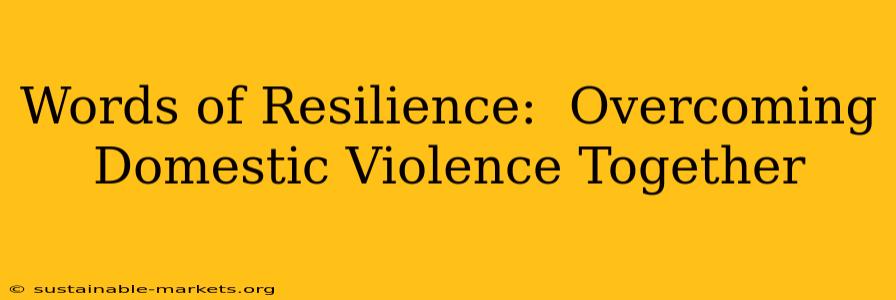Domestic violence is a pervasive issue affecting millions worldwide, leaving victims feeling trapped, isolated, and hopeless. But the truth is, there is hope, and there is help. This isn't just about surviving; it's about thriving, rebuilding, and reclaiming your life. This article explores the journey of overcoming domestic violence, providing resources and insights for victims, loved ones, and anyone committed to ending this cycle of abuse.
Understanding the Cycle of Abuse
Domestic violence isn't just about physical violence; it encompasses a range of abusive behaviors including emotional, verbal, financial, and psychological abuse. Understanding the cyclical nature of abuse is crucial. The cycle typically involves a build-up of tension, followed by an explosion of violence or abuse, then a period of remorse and reconciliation, before the cycle begins again. This pattern keeps victims trapped, making it difficult to leave.
What are the signs of domestic abuse?
Recognizing the signs of domestic abuse, both in yourself or others, is the first step towards intervention. Signs can include but are not limited to: controlling behavior, threats of violence, isolation from friends and family, constant criticism or belittling, financial control, and intimidation. Physical bruises and injuries are also clear indicators, but often, the most damaging abuse is invisible.
Seeking Help: You Are Not Alone
The feeling of isolation is a powerful tool abusers use to maintain control. Remember, you are not alone. There are resources and support systems available to help you break free.
Where can I find help for domestic violence?
Many organizations provide confidential support, including hotlines, shelters, and counseling services. These resources offer a safe space to discuss your situation, develop a safety plan, and access legal assistance. A quick online search for "domestic violence resources [your location]" will provide local options.
Building Resilience: The Path to Recovery
Recovering from domestic violence is a journey, not a destination. It requires time, patience, and self-compassion. Focusing on building resilience is key to healing and moving forward.
How long does it take to recover from domestic abuse?
There's no set timeline for recovery. Healing is a personal process, and it varies from person to person. Some find support groups helpful, while others prefer individual therapy. The key is to be patient with yourself and allow yourself the time and space you need.
How can I rebuild my life after domestic violence?
Rebuilding your life after domestic violence involves several steps. This includes creating a safety plan, seeking legal aid if necessary, focusing on self-care, connecting with support networks, and working towards your personal and professional goals. It’s also crucial to address any underlying trauma through therapy or counseling.
Supporting Loved Ones: How to Help
If you suspect someone you know is experiencing domestic violence, it's important to approach the situation with sensitivity and support. Don't judge or pressure them, but let them know you're there for them unconditionally.
How can I support a friend or family member experiencing domestic violence?
Offer practical help, like childcare or errands, listen without judgment, validate their feelings, and encourage them to seek professional help. Remember, you cannot force someone to leave an abusive situation, but you can provide a safe and supportive space for them. Educate yourself on domestic violence and the resources available in your community to better understand how you can assist.
Breaking the Cycle: A Collective Effort
Ending domestic violence requires a collective effort. This includes raising awareness, challenging societal norms that perpetuate abuse, and supporting organizations dedicated to providing help and resources to victims.
What can I do to help prevent domestic violence?
Educating yourself and others about the signs of abuse, challenging harmful stereotypes and gender roles, and supporting organizations dedicated to ending domestic violence are crucial steps. By actively promoting healthy relationships and speaking out against abuse, you can contribute to creating a safer and more equitable society for everyone.
This journey of overcoming domestic violence is a testament to the strength of the human spirit. Remember that help is available, and you deserve a life free from fear and abuse. Your resilience is your greatest weapon.

